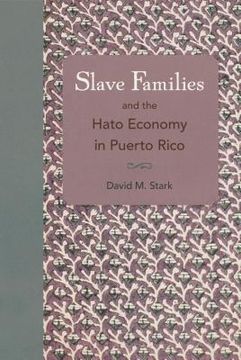Share
Slave Families and the Hato Economy in Puerto Rico (in English)
David M. Stark
(Author)
·
University Press of Florida
· Paperback
Slave Families and the Hato Economy in Puerto Rico (in English) - Stark, David M.
$ 25.09
$ 31.36
You save: $ 6.27
Choose the list to add your product or create one New List
✓ Product added successfully to the Wishlist.
Go to My WishlistsIt will be shipped from our warehouse between
Monday, June 10 and
Tuesday, June 11.
You will receive it anywhere in United States between 1 and 3 business days after shipment.
Synopsis "Slave Families and the Hato Economy in Puerto Rico (in English)"
"Deftly uses the available parish registers to document the stages of the coming of African men and women to Puerto Rico in the eighteenth century and reveals patterns of family formation and bonds of solidarity among the African slaves and with the rest of society."- Fernando Pico, author of Puerto Rico Remembered "An exceptionally well researched, highly original, cogently argued and engagingly written work."-Franklin W. Knight, coeditor of Contemporary Caribbean Cultures and Societies in a Global Context "A welcome contribution to the history of eighteenth-century Puerto Rico and an important model for anyone using sacramental records to study slave life in colonial Latin America."-David Wheat, Michigan State University Scholarship on slavery in the Caribbean frequently emphasizes sugar and tobacco production, but this unique work illustrates the importance of the region's hato economy-a combination of livestock ranching, foodstuff cultivation, and timber harvesting-on the living patterns among slave communities. David Stark makes use of extensive Catholic parish records to provide a comprehensive examination of slavery in Puerto Rico and across the Spanish Caribbean. He reconstructs slave families to examine incidences of marriage, as well as birth and death rates. The result are never-before-analyzed details on how many enslaved Africans came to Puerto Rico, where they came from, and how their populations grew through natural increase. Stark convincingly argues that when animal husbandry drove much of the island's economy, slavery was less harsh than in better-known plantation regimes geared toward crop cultivation. Slaves in the hato economy experienced more favorable conditions for family formation, relatively relaxed work regimes, higher fertility rates, and lower mortality rates.
- 0% (0)
- 0% (0)
- 0% (0)
- 0% (0)
- 0% (0)
All books in our catalog are Original.
The book is written in English.
The binding of this edition is Paperback.
✓ Producto agregado correctamente al carro, Ir a Pagar.

